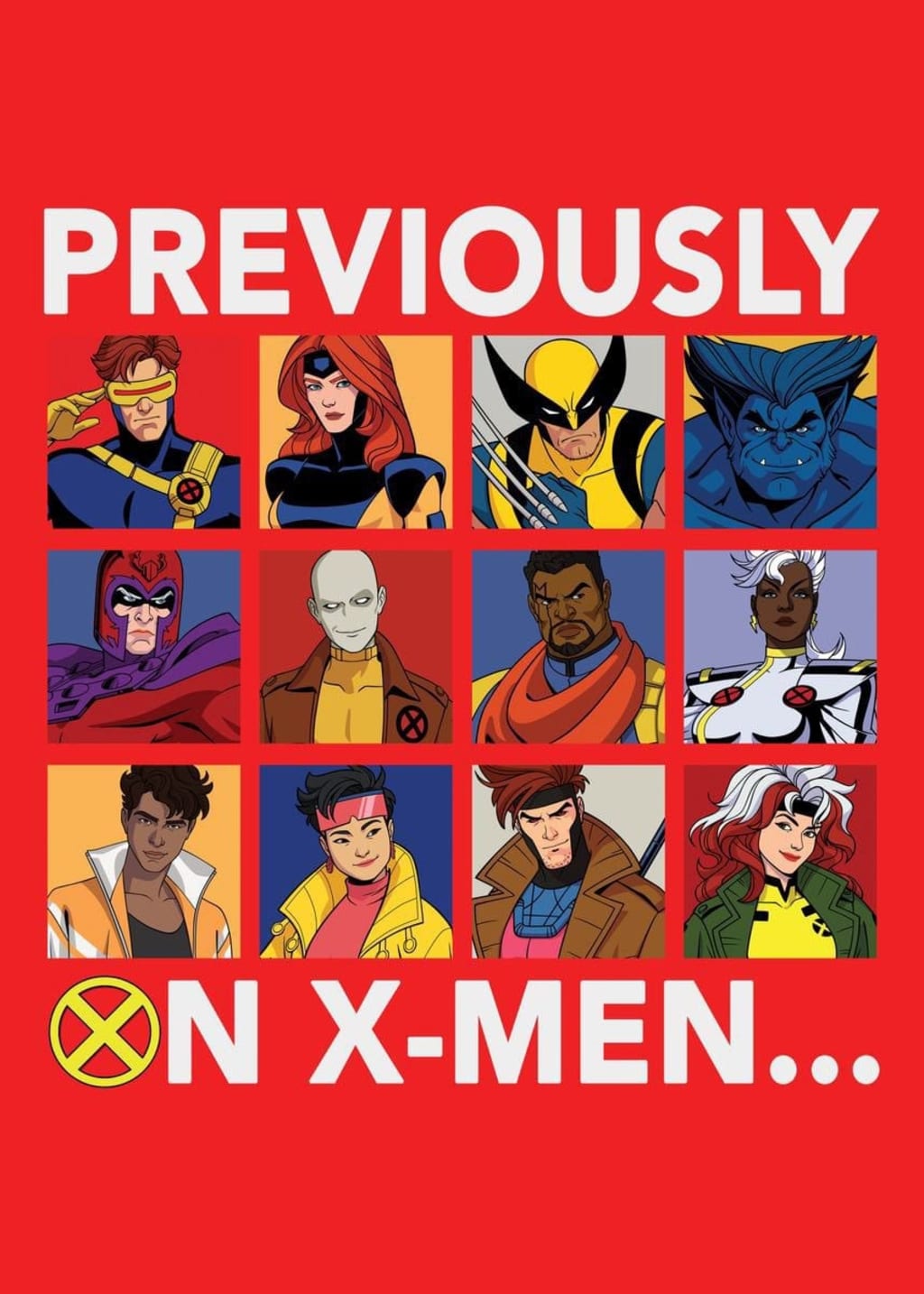Responding to Reception for My X-Men Article
After some interesting reception to my previous article regarding X-Men’97, I responded with some more Disney and Marvel Trivia.

On February 16, 2024, I published an article titled "X-Men Has Always Been 'Woke'" on Vocal. It addressed the controversy surrounding the portrayal of a non-binary character in a Disney show. The article highlights the X-Men's history of storytelling that tackles social justice and human rights issues, which has been a fundamental part of its identity since the 1960s. While the article received positive feedback from Marvel fans who appreciated the exploration of these themes, there were those who insisted that Disney shouldn't tell politically driven storylines, dismissing them as "woke."
However, the exploration of real-world themes in fictional narratives is not new to Disney. Throughout its history, many Disney movies and shows have explored similar issues. This long-standing tradition adds significance to the X-Men series' exploration of social justice and human rights.
Despite the controversy, it's clear that X-Men is not the only Disney property to explore these issues. Disney's history is replete with examples of storytelling that tackles social justice and human rights, making X-Men just one part of a larger commitment to using storytelling to address important issues.
Several Animated Disney and Pixar Films Have Explored Social Justice Issues
In the realm of animated Disney films, social justice themes have been intertwined with captivating storylines long before the term "woke" became a far-right buzzword. These films have addressed issues such as animal welfare, the environment, class differences, racial discrimination, mental health, and cultural diversity.
Examples of Disney films that tackle social justice issues include:
1. Animal Welfare:
- Dumbo (1941): Explores animal welfare issues centered on the keeping of animals in human care.
2. Environment:
- Bambi (1942): Takes a stand against hunting and highlights the impact of human activities on nature.
- Tarzan, Moana, Wall-E, Up, and Pocahontas all address environmental concerns and the fragile relationship between humans and the planet.
3. Class Differences:
- Lady and the Tramp (1955): Examines the challenges faced by characters from different socioeconomic backgrounds.
- The Princess and the Frog (2009): Explores class differences and the struggles of African Americans in the 1920s.
4. Racial Discrimination:
- Hunchback of Notre Dame (1996): Presents a cautionary tale about the dangers of racial discrimination and the importance of inclusivity.
- Zootopia (2016): Tackles issues of prejudice, discrimination, and diversity.
5. Mental Health:
- Frozen (2013) and its sequel (2019): Address mental health themes through Queen Elsa's struggle with her ice powers and societal expectations.
- Inside Out (2016): Visualizes emotions and emphasizes the importance of acknowledging and embracing all feelings.
- Encanto (2021): Explores traumatic experiences, self-doubt, and the desire to fit in, while highlighting the significance of understanding and supporting those with challenges.
6. Cultural Diversity:
- Moana, Coco, Princess and the Frog, Mulan, Aladdin, and Elena of Avalor celebrate diverse cultures and contribute to an inclusive representation of underrepresented groups.
These animated Disney films not only entertain but also provide valuable insights into important social issues, fostering understanding and appreciation among audiences of all ages.
Marvel’s Long History of Exploring Social Justice Issues
“Bigotry and racism are among the deadliest social ills plaguing the world today.”. - Stan Lee (1922-2018)
Since its inception in the 1930s, Marvel Comics has created stories that explore social justice issues. Similar to the X-Men, the Avengers-centric stories, like Captain America, often engage with real-world issues, ranging from World War II to contemporary geopolitical concerns, with the X-Men addressing social issues that parallel civil rights struggles, while Ms. Marvel and Captain Marvel's storylines align with societal shifts towards gender equality. Regarding mental health, Iron Man's solo comic series has a long history of addressing mental health struggles, helping to reduce stigma.
Marvel’s storytelling incorporates social justice elements into the Disney Marvel Cinematic Universe by including them in movies and shows. These elements are reflected in Black Panther, which explores identity, representation, and the responsibility of power; Captain Marvel, addressing gender equality; Iron Man 3, examining the consequences of weapons manufacturing and terrorism; and Captain America: Civil War delving into unchecked power and accountability. Spider-Man: Homecoming deals with socio-economic disparities and the titular hero's role in his community, while Avengers: Age of Ultron discusses the unintended consequences of advanced technology. Captain America: The Winter Soldier touches on surveillance, freedom, and questioning authority, and Thor: Ragnarok explores colonialism and leadership responsibility.
Both the comics and movies continue the tradition of incorporating social issues into their narratives, allowing them to resonate with diverse audiences and sometimes influence broader cultural conversations. They also include storylines that highlight the experiences of LGBTQ+ characters, contributing to discussions about diversity and inclusivity. Their focus on action doesn't prevent the integration of social commentary, enabling audiences to reflect on broader societal issues.
Stories Around War and Social Justice Issues Are the Primary Blue Prints of The Star Wars Franchise.
The Star Wars franchise has a rich history spanning nearly five decades and has consistently explored themes of war and social justice. The original trilogy, for instance, depicted the Rebel Alliance's struggle against the oppressive Galactic Empire, resonating with real-world conflicts involving oppressive regimes. The underdog's fight for justice and freedom was highlighted. Decades later, the animated series Star Wars: Rebels, set just before 1977's A New Hope, explored challenges like forming alliances, ideological conflicts, and personal sacrifices.
The prequel series, including the prequel film trilogy, Star Wars: The Clone Wars, and Star Wars: The Bad Batch, delved into political and social commentary. It explored the rise of the Galactic Empire, the Clone Wars, and the fall of Mandalore as an independent state. The stories focused on the manipulation of political systems, the consequences of war, authoritarianism, and the erosion of democratic values. They also highlighted the struggles of marginalized individuals and the devastating impact of war on ordinary people, raising questions about identity, loyalty, and the consequences of war on communities.
The more recent Sequel trilogy and its prequel series, Star Wars: Resistance, heavily emphasized the theme of resistance against oppressive regimes. The rise of the First Order and the formation of General Leia Organa's Resistance movement paralleled ongoing real-world struggles for justice. The challenges faced by those fighting for justice were also explored.
Throughout its long history, Star Wars has maintained its relevance by intertwining timeless themes of war and social justice issues with interesting characters and epic narratives that resonate with global audiences. The franchise offers nuanced perspectives on war, resistance, and social justice, exploring the complexities of morality, the consequences of conflict, and the importance of individuals standing up against injustice in a galaxy plagued by war and tyranny.
To Anyone Who Says Disney Was Never “Woke”, Nor Should Be
The discussions surrounding my article, titled "X-Men Has Always Been “Woke”, have highlighted the significance of social justice storytelling within Disney, Marvel, and beyond, as exemplified by the enduring legacy of the Star Wars franchise. While opinions may differ on including politically charged narratives, the historical context of Disney's exploration of real-world themes and Marvel's dedication to social justice through comics and the Marvel Cinematic Universe underscore the relevance and importance of these discussions in shaping the evolution of storytelling.
Animated films, comic books, and epic sagas offer diverse narratives that transcend mere entertainment. They serve as powerful mediums that foster understanding, promote inclusivity, and encourage reflection on pressing social issues of our time. As we navigate this rich landscape of storytelling, let us appreciate the valuable insights and discussions that arise from the intersection of imagination and real-world complexities, continuing to embrace the richness of narratives that push the boundaries of fiction.
About the Creator
Jenna Deedy
Zoo and Aquarium Professional, Educator, Cosplayer, Writer and B.A. in Psychology whose got a lot to share when it comes to animals, zoos, aquariums, conservation, and more.
Instagram: @jennacostadeedy






Comments
There are no comments for this story
Be the first to respond and start the conversation.